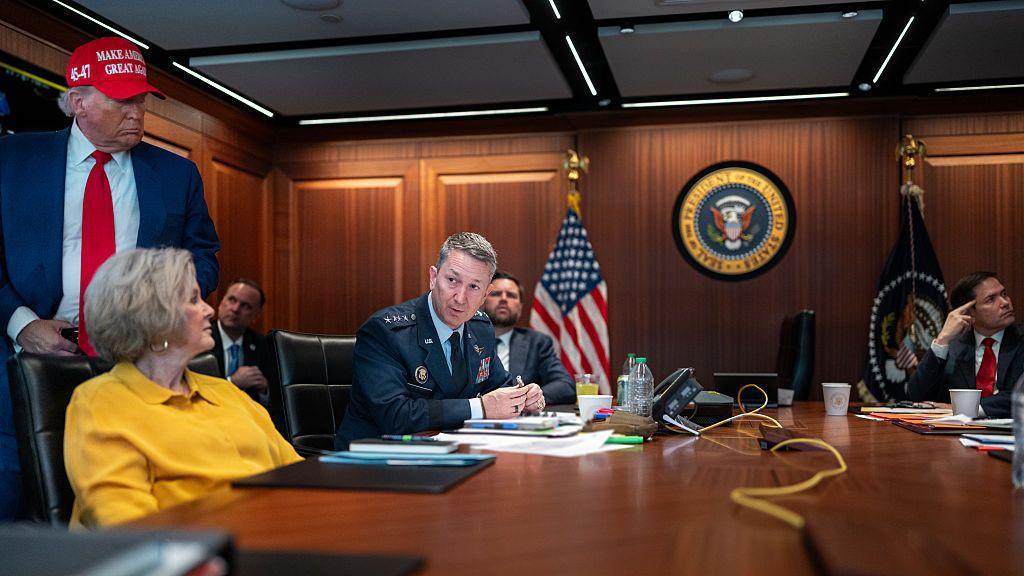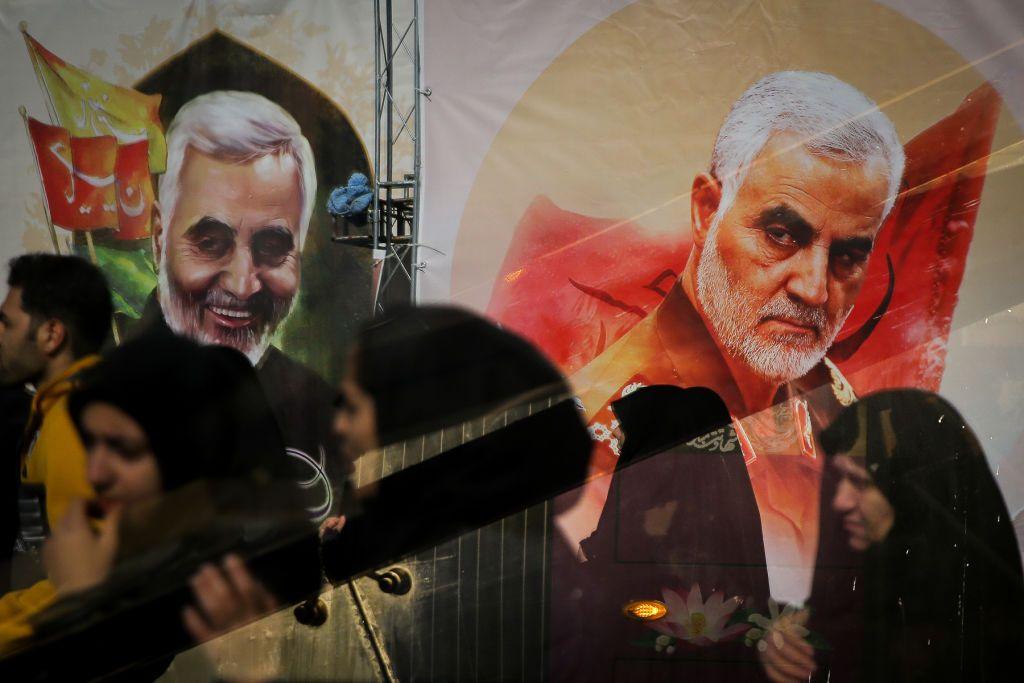Did Trump have the legal authority to strike Iran?

- Published
Since US President Donald Trump ordered strikes on several nuclear facilities in Iran over the weekend, Democrats as well as lawmakers from his own party have questioned his legal authority to do so.
Republican Congressman Thomas Massie said on X that the strikes were "not Constitutional", and another Republican Congressman Warren Davidson wrote "it's hard to conceive a rationale that's Constitutional".
But Republican Speaker of the House Mike Johnson defended the president, saying he "evaluated that the imminent danger outweighed the time it would take for Congress to act" and that there's "tradition of similar military actions under presidents of both parties".
BBC Verify has asked legal experts whether Trump's actions were in line with the Constitution or whether he should have consulted Congress first.
What does the Constitution say about military action?
There are two parts of the US Constitution that are relevant here: Article I and Article II.
Article I specifically lists the ability "to declare war" as one of Congress' powers.
However, Article II - which lays out the president's powers - says that "the president shall be Commander in Chief of the Army", and sources at the White House have told the BBC they see this as the rationale for the strikes on Iran.
Constitutional experts have said that Article II gives the president the authority to use military force in certain circumstances.
The circumstances aren't specifically laid out in the Constitution - but they have been subsequently interpreted to include "actual or anticipated attacks" or to "advance other important national interests," according to experts at the Council for Foreign Relations, external.
These interests could include the prevention of nuclear proliferation - which the Trump administration said was their justification for the Iran strikes.
Four constitutional experts told BBC Verify that Trump had some authority under these circumstances to order the military strikes.
"The short answer is yes, he did have the authority here," says Claire Finkelstein, a professor at the University of Pennsylvania Law School. "There is a long standing practice of presidents engaging in isolated military engagements without congressional approval."

President Trump was joined in the Situation Room by senior members of his administration
Another constitutional law expert, Jessica Levinson at Loyola Marymount University, said the president has limited authority to authorise air strikes as long as it "doesn't begin to resemble a war, and there is no clear definition of when that occurs".
However, Andrew Rudalevige, a professor of government at Bowdoin College, told BBC Verify he didn't believe Trump had the authority to launch the latest strikes as there wasn't "a sudden attack to repel".
Although Article I gives Congress the power to declare war, the provision has rarely been used.
The last time Congress invoked this power was in 1942 during the Second World War, external.
And experts also said that presidents using their authority to order military actions without getting approval from Congress has become more common.
John Bellinger, who was a legal adviser in the White House under President George W Bush, said: "Over the last several decades, Congress has acquiesced more and more in presidential uses of military force for a variety of purposes without congressional authorisation."
"Congress and the courts have effectively negated the requirement of a declaration," Jonathan Turley, a conservative constitutional expert, told BBC Verify.
What have other presidents done?
President Barack Obama authorised airstrikes in Libya without requesting permission from Congress, which his administration justified under Article II, as was the case for the mission to kill Osama Bin Laden in Pakistan in 2011.
And during Trump's first term in office, he ordered the killing of Iranian military officer Qasem Soleimani without congressional approval.
Democratic President Bill Clinton launched strikes in the Balkans in the 1990s without prior approval, and more recently, Joe Biden did the same when hitting Houthi targets in Yemen as well as in Syria during his presidency.

Qasem Soleimani was killed in 2020 by a US airstrike
"This authority has been repeatedly used by presidents throughout our history," said Mr Turley. "History and precedent favours Trump in this action."
Speaker Johnson cited examples by previous administrations when defending Trump, saying: "Presidents of both parties have acted with the same commander in chief authority under Article II."
"President Obama went on an eight month campaign bombing Libya to take down the regime there. I never heard a Democrat balk about any of that, and suddenly, now this, they're just up in arms."
What about other laws?
Critics of Trump's strikes on Iran have also pointed to the War Powers Resolution which was passed in 1973 following America's withdrawal from the Vietnam War to limit the president's ability to wage war without consulting Congress first.
Although the law does allow the president to use force without Congressional approval in emergencies, it states that they should "in every possible instance shall consult with Congress before introducing United States Armed Forces into hostilities".
"It does not appear that President Trump complied with this requirement," says Mr Bellinger. "Based on reporting so far, it appears that President Trump did not actually have substantive consultations with Congress, but rather simply informed several Republican leaders."
US media has reported, external that Democratic Senate Minority Leader Chuck Schumer had been called about an an hour before the strikes began but given little detail.
The White House Press Secretary Karoline Leavitt wrote on X, external that the administration made "bipartisan courtesy calls to Congressional leadership" and spoke to Senator Schumer in advance of the strikes.
The resolution also says that Congress must be notified within 48 hours after military action has taken place.
Secretary of Defense Pete Hegseth said following the strikes on Iran that Congress "were notified after the planes were safely out" and that they "complied with the notification requirements of the War Powers Act".
Clarification: An earlier version of this article said that the last time Congress used its Article 1 power to declare war was in 1942 - after Japan bombed Pearl Harbor. War was declared against Japan in December 1941. Congress declared war against Bulgaria, Hungary and Romania in 1942.
